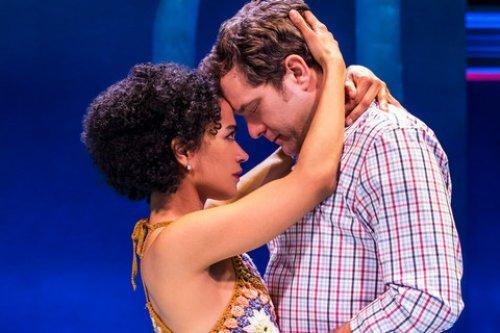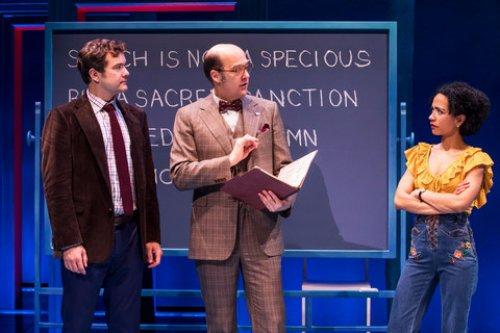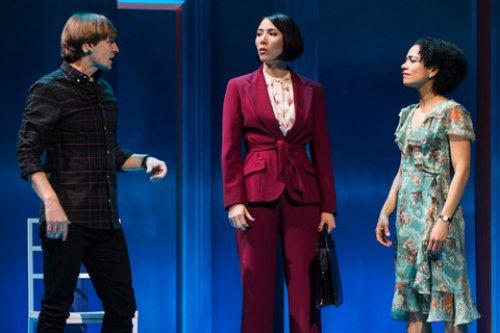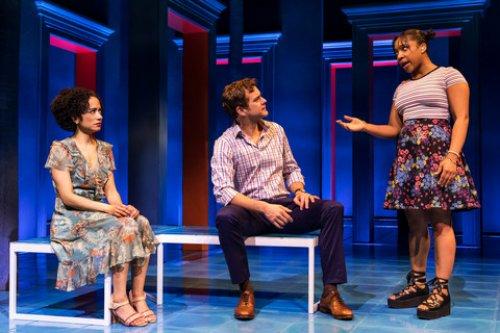Children of a Lesser God
The 1980 Tony Award winner for Best Play about a speech teacher’s romance with a deaf woman, wonderfully played by Lauren Ridloff, is unevenly revived.

Lauren Ridloff and Joshua Jackson in a scene from Mark Medoff’s “Children of a Lesser God” (Photo credit: Matthew Murphy)
[avatar user=”Darryl Reilly” size=”96″ align=”left” ] Darryl Reilly, Critic[/avatar]The power of author Mark Medoff’s passionate, involving and meticulously crafted 1980 Tony Award winner for Best Play, Children of a Lesser God transcends this uneven revival. Mr. Medoff’s superior command of dramatic writing encompasses two substantial leading roles and several rich supporting parts.
Ex-Peace Corp volunteer and troubled James Leeds, a man in his 30’s, is a speech teacher at school for the deaf run by the amiable though steely Mr. Franklin. James becomes infatuated with Sarah Norman, a 26-year-old woman who works as a cleaning woman at the school. She was born deaf, was a student there and is estranged from her mother. The deaf student Orin is a fiery champion of deaf solidarity and has feelings for Sarah. There is also the lively Lydia, a student with some residual hearing.
The events are told as a memory play from James’ perspective. Medoff joins his engaging love story with a conflict over a social issue. Sarah, stands apart from James and the other deaf characters by refusing to learn to attempt to speak, instead communicating through American Sign Language. This clash dominates the play’s second act resulting in searing conflicts.
Director Kenny Leon imposes an odd production design on the presentation that is distracting. In his stage directions Medoff writes “The stage is bare, holding only a few benches and a blackboard and permitting characters to appear and disappear easily.”

Joshua Jackson, Anthony Edwards and Lauren Ridloff in a scene from Mark Medoff’s “Children of a Lesser God” (Photo credit: Matthew Murphy)
Instead, scenic designer Derek McLane has the stage set with a series of tall elaborate white doorframes interspersed with tall thin tree trunks. This could be quite suitable for a Shakespearean or a Chekhovian work but here it’s visually incongruous. Above the stage supertitles of the dialogue and descriptions of the music are projected.
The theatrical displacement is compounded by Mike Baldassari’s lighting design that periodically bathes everything in shades of dark blue, deep red and a variety of hues. These pyrotechnics sidetrack the play’s focus. That we’re in the late 1970’s is only really gleaned from sound designer Jill BC Du Boff’s samplings of pop songs of that era. The opening has the audience sitting and waiting for the play to actually start as Stevie Wonder is heard; later on there are doses of Paul McCartney. These technical elements are all accomplished but out of place. Costume designer Dede Ayite’s macramé and bell bottoms ensembles for Sarah evoke the fashions of the time and her creations for the other characters are artfully realized as well.
“The author insists that—in any professional production of this play—the roles of Sarah, Orin and Lydia be played by deaf or hearing-impaired actors.” Mr. Leon follows this edict with great success but a primary casting selection is not as inspired.
A regular on the television series Dawson’s Creek and currently appearing on The Affair, the affable Joshua Jackson plays James. Mr. Jackson’s talents are not showcased in this production. Jackson’s speech pattern is monotonous and his lack of sensuality makes the attraction between him and Sarah less than palpable. He gets through the role with professionalism but with little impact. Others in the cast make up for this void but the vacuum of implausibility looms.

John McGinty, Julee Cerda and Lauren Ridloff in a scene from Mark Medoff’s “Children of a Lesser God” (Photo credit: Matthew Murphy)
A former Miss Deaf America, Lauren Ridloff is majestic as Sarah. Lithe, physically expressive and with her animated features, Ms. Ridloff exhibits intensity. Ridloff’s commanding use of sign language and her vivacious presence enrich her heartbreaking performance.
John McGinty’s dynamic portrayal of Orin is so fascinating that the play could be about him. The youthful, athletic and shaggy-haired Mr. McGinty’s natural voice of variable pitches and personal charisma conveys the anger and emotion of this idealistic warrior.
A key player is such films as Top Gun and known for his role of Dr. Mark Greene on ER, Anthony Edwards makes his Broadway debut as Mr. Franklin. It’s an enjoyable turn without much heft.
The indomitable Kecia Lewis’ scenes as Sarah’s mother are wrenching. Comic relief is provided by the charming Treshelle Edmond’s winning characterization of Lydia. Julee Cerda delightfully makes the most of her appearances as a crusading lawyer who intercedes on behalf of the students over a dispute.

Lauren Ridloff, Joshua Jackson and Treshelle Edmond in a scene from Mark Medoff’s “Children of a Lesser God” (Photo credit: Matthew Murphy)
Children of a Lesser God began as a series of workshops and productions at New Mexico State University. Medoff based the play on the life of deaf actress Phyllis Frelich and her husband Robert Steinberg. Gordon Davidson directed a revised version at Los Angles’ Mark Taper Forum in 1979.
It transferred to Broadway with Ms. Frelich as Sarah and John Rubinstein as James, opening on March 30, 1980 and running for 887 performances. In addition to winning the Tony Award for Best Play, Frelich and Mr. Rubinstein won the awards for Best Actress and Best Actor in Play. The 1981 London production won the Laurence Olivier Award for Best New Play.
Director Randa Haines’ 1986 film adaptation was nominated for the Academy Award for Best Picture and 21-year-old Marlee Matlin became the youngest winner of the Academy Award for Best Actress as Sarah. William Hurt was nominated as Best Actor for playing James and Piper Laurie was nominated for Best Supporting Actress as Mrs. Norman.
One could analyze and critique from today’s perspective the treatment of various societal concerns that were dramatized nearly 40 year ago in Children of a Lesser God. The main thing is that it holds up as an affective stage piece but is considerably let down by this problematic production.
Children of a Lesser God (through May 27, 2018)
Studio 54, 254 West 54th Street, in Manhattan
For tickets, call 800-447-7400 or visit http://www.childrenofalessergodbroadway.com
Running time: two hours and 30 minutes including one intermission






A great — which follows the relationship between a deaf female janitor and a hearing teacher at a school for the deaf.
“Not So Shitty Airplane Coffee” A review of COALG
Whenever there’s a conference I’m attending, I’d take every opportunity to check out any local Deaf (or any minority group which I also identified with) event in wherever I’m visiting. Thanks to AERA conference in NYC, a couple of my colleagues and I took the advantage to watch “Children of a Lesser God” on Broadway at Studio 54 last Saturday. We were utterly ecstatic to witness this play to go on Broadway for the first time with a Deaf Woman-of-Color (after the first Broadway show in 1980) as the star. Lauren Ridloff plays the main character, Sarah Norman, who’s a Deaf non-speaking janitor. Most importantly, this was Ridloff’s debut to go on a Broadway stage while playing opposite to Joshua Jackson as James Leed, a new speech therapist. After corresponding with several other Deaf attendees, I feel compelled to write this since there are still not enough Deaf reviewers and being outside of the entertainment business, my career isn’t at risk. We have already read some articles, all written by hearing non-signers who raved about Ridloff’s aesthetically arm-flowing (or flapping) movements but gave begrudgingly criticism on Jackson or as once referred on the stage as Mr. “Lazy” (similar to his namesign). So I’d like to offer my Deaf and ASL-fluent signer’s perspective, and not only that but also a review coming from a light-skinned female African-American.
Currently on my way back home to Long Beach, this non-distracting flight is allowing me to digest with everything from that play, with free bottomless airplane coffee. Presented with a dilemma on framing this review either as supportive for this successful show, starring with two Black (one biracial) Deaf female actresses, or as brutally honest in order to encourage us all to learn from this lesson, I decide to take the tougher path with the latter. Take notes y’all, this gonna be my last time to watch this outdated storyline. The director, Kenny Leon, a Black hearing male non-fluent signer, did a terrific job maintaining this performance faithfully to the original script, written by Mark Medoff, a hearing White playwright in 1979. I could sense the (awkward) racial tension that was tempted and teased to release and shift this storyline elsewhere but unfortunately for me, it didn’t. However, I still need to express my “teeth-grinding” disappointment watching the amateurish quality of acting. Oftentimes, I resisted from doing #facepalm since I needed my (reddened) eyes to watch every signed line, despite some signs were squashed and overlapped among their scripted lines.
First of all, my group purchased our tickets several months ago before the theater decided to offer ASL-interpreted nights. We arrived and found out that it was same schedule as one of their ASL nights (with Deaf attendees sitting marginalized on the left side of the audience) while we sat right in the middle of the orchestra. We had the best view seeing both of Ridloff’s and Jackson’s signed lines and the captions, placed on the top, above the stage. We still had to look far up and sympathize with those who sat in the front rows (or the Deaf section) to bend their heads far back to read the captions! Nonetheless this bimodal (both signed and textual communication) accessibility was truly luxury for us all, different signers (various ASL competencies) wanting to know what exactly has been spoken too. Hope this trend will pick up with future plays! While we could see the signings well, the attendees in the Deaf section, on the other hand, had reported that some signed lines weren’t visible to them. How’s that for irony when this show is intended to empower the Deaf people? When we couldn’t understand Jackson’s clumsy signs, we’d peek over to the interps on the far left of our vision—or look upward. So it was a large triangular point of views that involved lots of neck rotations, thanks to this overloaded accessibility!
Secondly, to my understanding, Jackson is limited on articulating lines between himself and Sarah, which my hearing friend explained sounding as an “announcer’s voice”. Pitifully, Sarah couldn’t be expressed in voice with various intonations while her signs engaged with so much emotions and yet expressed in 150-mph speed of signing. Again, from a Deaf signer’s perspective, I must add to that bemoaning response to how unarticulated other actors were. From an insider’s information, Ridloff’s signed lines were rehearsed with a stopwatch. Eh??? Do you do that with speech? Being married with a fashionista of ‘70’s wardrobe myself, I pay an extra attention to this theme of outfits. Someone needs to explain to the wardrobe designer to dress the signers in high contrasting colors (light to dark solid colors) to make the signs more visible and articulated. Oftentimes, Ridloff’s signs are lost in so much visually noise in her clothing. This wouldn’t work with speech overlapping any unnecessary background noise. Finally about registry of sign language, I’m fairly impressed with Jackson’s mostly intelligible signing skills. Although his registry is much closer to ASL, less signing exact English (SEE) which dissociated from his supposedly character as a speech therapist. If you ask any Deaf person for any (traumatic) memory of going speech therapy, barely would anyone claim having a fully ASL-fluent speech therapist! And is this how ASL was signed in late-70’s/early-80’s? It felt too modernized without any historical word/sign used. Yet all of these decisions were made by the language consultant of this play. *shrugs*
Thirdly, back to the “awkward” racial tension, how can I, as a Black woman, am supposed to take this well while a White male signer is voicing and interpreting half-assedly for Sarah?! Adding on top of that, to see the second Black Deaf female actress, Treshelle Edmond, throwing herself (Lynda) to a White hearing savior?? Lastly, James’s patronizing jokes were winning the audience entirely in the wrong way. So many hearing playgoers, unaware with Deaf culture, are walking away with the wrong impressions that Deaf and/or Black woman can’t function without help of a hearing and/or White spouse. Yes it is truly a sensitive issue for any Deaf-hearing or interracial relationship and this is actually personal for me. Normally people would make a decision at the beginning of each relationship involving with disparity of power between any different hierarchical statues that so many of us could find this theme relatable. But Jackson’s role isn’t helping with this sensitivity.
Finally, fourth of all, the acting quality truly got me stumped. It’s split equally in bipolar points of masterfully and shitty done. I’m sorry sistas but you both severely need to take up more acting training. Really, this is on the director for not giving you the needed extra attention due to your characters being displayed so shallow. Sarah should have been reflected as a strong and fierce woman but was emitted with Ridloff’s vulnerability with slouched shoulders and multiple awkward and unconvincing facial expressions of dismissive, dubious, and unconcerned looks shown simultaneously. Treshelle, your character isn’t supposed to look like a 12-years old girl! Your posture needs to be portrayed more grown up like a young teen/adult and a seductive one (like shown on “Master of None”—S2/E6). Finally, the chemistry between Jackson and Ridloff is profoundly lost that so many of us were totally not convinced by the romance between them. Jackson had us easily hooked with his sorrow about losing his mother through his free-flowingly tears while Ridloff faked hers with her back shown to us. We Deaf attendees had to rely on the captions of sounds “cries,” implying that she did cry. The emotions throughout of this storyline were both rushed and unconvincing until Orin came on and saved the play. This character was performed by Johnny McGinty, and impressed us with his intense dilemma of becoming political and accidentally hypocritical while trying to pull his close friend Sarah into his fight for Deaf rights. Thanks to his nearly authentic emotions, he kept me from falling asleep and eventually saw Ridloff’s improved acting quality in the second half after the intermission. Btw, can y’all let me know why her (low-voiced) screaming wasn’t captioned? Notably, another small part of Sarah’s mother, performed by Kecia Lewis was absolutely soothing to my eyes seeing her as Mother Hen and feeling her deep pain over the strained relationship between herself and her daughter.
Now, on my third cup of not-so-shitty airplane coffee, I’m thinking “Nope, not today.” I just could not do this delicately since this wondrous opportunity was totally missed from other incredible and more experienced Deaf actresses. Kenny Leon, put aside your nepotism (no open audition available) and your fetish of Black signing women. Try to swap the race around in each character and then maybe, maybe this play can be half convincing and not so racially and sexually awkward, especially with today’s climate of #BLM and #MeToo. Since this is a repeated pattern of a hearing non-ASL-fluent director, perhaps for future Deaf-related plays, this is a calling for co-directorship with a culturally-Deaf person. Since this slogan of this show is #StartListening, then I suggest you to ask around with Deaf theater-goers for their feedback. Do not limit to Nyle DiMarco, supposedly the “producer” of this play, who overlooked several problematic issues of this production, given his White male perspective. Reach out to other Deaf People-of-Color, especially women, for their observations.
Good luck with the rest of the scheduled run of this play. Let me know when someone or anybody from Deaf West Theatre writes a revival version of this shortly outlived storyline.
SIGNed,
Rezenet Moges-Riedel